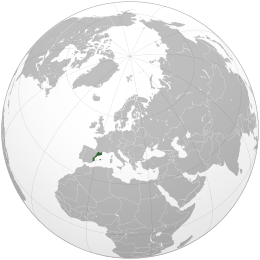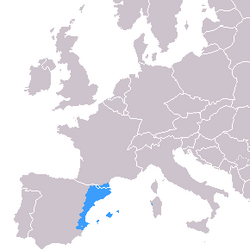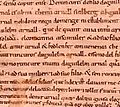Catalan language facts for kids
Quick facts for kids Catalan |
||||
|---|---|---|---|---|
| català | ||||
| Pronunciation | (EC) ~ (WC) | |||
| Native to | Andorra, France, Italy, Spain | |||
| Region | See geographic distribution of Catalan | |||
| Ethnicity | Catalan people | |||
| Native speakers | 11.5 million (2009) | |||
| Language family |
Indo-European
|
|||
| Standard forms |
Catalan (regulated by the IEC)
Valencian (regulated by the AVL)
|
|||
| Writing system | Latin (Catalan alphabet) | |||
| Official status | ||||
| Official language in | Latin Union
|
|||
| Recognised minority language in |
|
|||
| Regulated by | Institut d'Estudis Catalans Acadèmia Valenciana de la Llengua |
|||
| Linguasphere | 51-AAA-e | |||
 |
||||
|
||||
The Catalan language is a Romance language spoken in Catalonia, Valencian Community, the eastern part of Aragon, the Balearic Islands, a small zone of Murcia (all of them in Spain), Andorra, North Catalonia (in France) and in the Italian city of L'Alguer. These places are often called the Catalan Countries.
The language most like Catalan is Occitan. It is also a bit similar to Spanish, Italian, French and Portuguese.
There are about 6 million Catalan native speakers and about 10 million people who can speak Catalan. The Catalan language is the 6th most spoken romance language and also is the most spoken language of the European Union that is not official.
Images for kids
-
Catalan Countries (Països Catalans): (In orange, strict Catalan-speaking area) NE modern Spain (Catalonia, Valencian Community and Balearic Islands), SE. France (Roussillon, touching the Pyrenees) and Comune of Alghero (NW coast of Sardinia, an island belonging to Italy)
-
Homilies d'Organyà (12th century)
-
Fragment of the Greuges de Guitard Isarn (ca. 1080–1095), one of the earliest texts written almost completely in Catalan, predating the famous Homilies d'Organyà by a century
-
Billboard in Barcelona (detail), showing the word il·lusió ("illusion")
-
Sign in the town square of Begur, Catalonia, Spain. In plaça de la vila (literally "square of the town"), since the noun vila ("town") is feminine singular, the definite article carries the corresponding form, la ("the").
See also
 In Spanish: Idioma catalán para niños
In Spanish: Idioma catalán para niños












